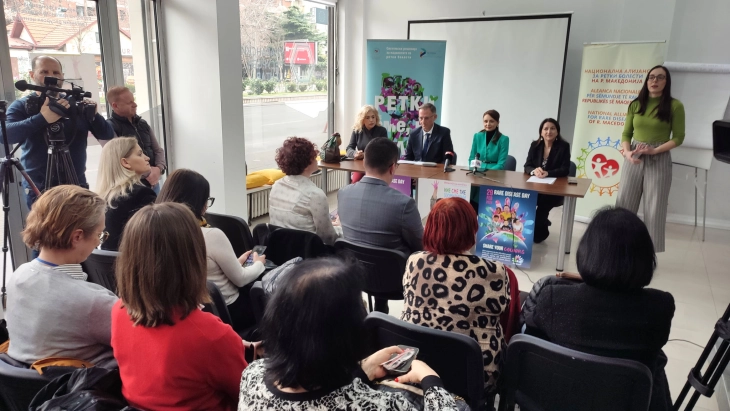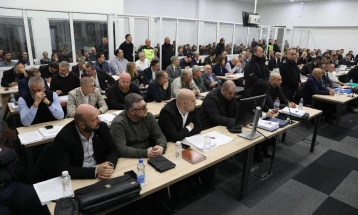Diagnosing rare diseases is difficult, complex and expensive, requires continued funding of therapy
- Rare diseases are a test of the declared social justice, equality and humanity of the Macedonian society. In addition to appropriate treatment, the social effect, community acceptance, and psychological state are also essential. Data shows that by the end of 2023, 822 people were on the register for rare diseases. Of these, less than half receive therapy, not because the country refuses to provide it, but because there is no therapy for all rare diseases.

Skopje, 29 February 2024 (MIA) - Rare diseases are a test of the declared social justice, equality and humanity of the Macedonian society. In addition to appropriate treatment, the social effect, community acceptance, and psychological state are also essential. Data shows that by the end of 2023, 822 people were on the register for rare diseases. Of these, less than half receive therapy, not because the country refuses to provide it, but because there is no therapy for all rare diseases.
Although the budget for the rare diseases program, through which therapy is provided, is continuously increasing, the Rare Diseases Strategy must be adopted as soon as possible.
These were the conclusions from Thursday's panel discussion held in Skopje, organized by the National Alliance for Rare Diseases of Macedonia (NARDM) on the occasion of Rare Disease Day.
Health Minister Ilir Demiri pointed out that developments in the world are continuously being monitored and investments are being made for the improvement of diagnostic procedures, and providing therapy for patients with rare diseases.
"In 2009, Mden 25 million were allocated at state level for patients with rare diseases, today that number is Mden 950 million. Not only for providing therapy, but also for investing in diagnostic procedures. The Ministry of Health will continue to take care of this category of patients," Demiri said.

Anti-discrimination commission spokesperson Dushan Tomshikj said children with rare diseases must not be segregated based on their condition, as they are often absent from the education system. He noted that conditions should be provided so that those children can continue their education at home or with some additional classes.
"The Commission for the Prevention and Protection against Discrimination urges the state to adopt the Strategy for Rare Diseases as soon as possible, containing all these challenges and areas previously mentioned. I hope that such a strategy and a good budget framework can eliminate all weaknesses," Tomshikj stressed.
He added that work should be done to raise awareness that these children are not at all dangerous and that this is something that can happen to anyone, but with the right treatment they can also attend classes.
NARDM representative Natasha Angjeleska noted that the availability of therapy is not the only challenge, but so are all other segments of daily life, adding that a person with a rare disease is often faced with the fear of survival, and the quality of live they can have.

"Rare Disease Day is celebrated every year on the last day of February. A person who has a rare disease is often faced with the fear of whether they will live, and if they do, what will be their quality of life and would it be possible to function as a person, get an education, a job, and function in society. So, the challenge is not only the availability of therapy or diagnosis, although in certain situations circumstances have been aggravating, but also includes all other segments of daily life," highlighted Angjeleska.
Our country, she added, doesn’t have the exact number of people diagnosed with a rare disease. This is because not everyone can get a diagnosis. However, according to the Health Ministry's data, 822 people were registered last year.
In recent years the Rare Disease Program, which provides therapy, has continuously been increasing, but, on the other hand, therapy is far too expensive or is rarely available on the market.
"Of these, less than half receive therapy, not because the state refuses to provide it, but because there is no therapy for all rare diseases. In recent years, the budget within the Rare Diseases Program, which provides therapy, is continuously increasing. However, there are always new patients and diagnosis. The issue is that therapy is far too expensive, and is rarely readily available on the market; also as a small country, we lack representative pharmaceutical companies," said Angjeleska.

First Lady Elizabeta Gjorgievska noted that around 6,000 rare diseases have been identified, and around 300 million people are affected worldwide. Among them, she added, is our small and brave community that deals with dignity with all health challenges of the rare diseases.
"The first thing about rare diseases is the diagnosis, which is extremely difficult, complex and of course even more expensive when it comes to specific protocols and drugs. In addition to appropriate treatment, the social effect, community acceptance and psychological state are also essential. It is crucial that in addition to the necessary health care and care, which in itself is complex and bears great financial implications as a community and society, it is necessary that we offer warmth, love, and care," Gjorgievska said.
Care and protection of rare disease patients, she noted, cannot have financial, administrative or any other barriers. Rare diseases are a test of the declared social justice, equality and humanity of the Macedonian society. A test of our humanity, sincerity and commitment, the First Lady highlighted. ssh/nn/
Photo: MIA







